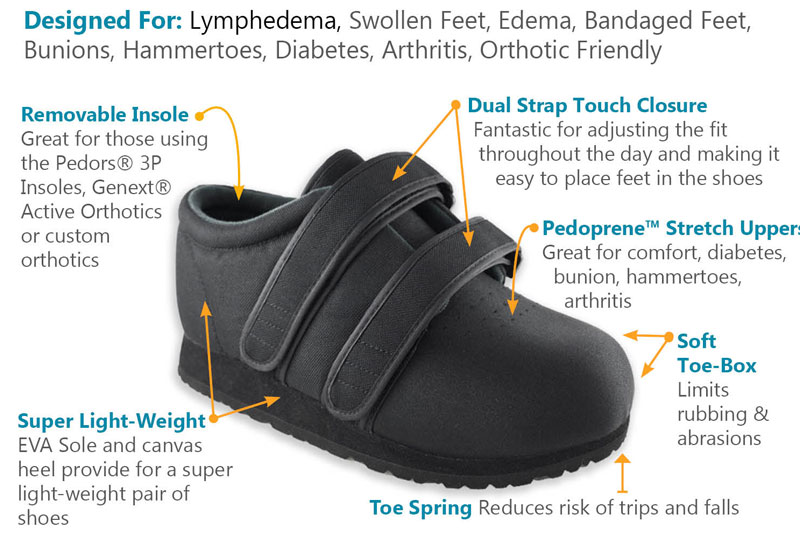Orthopedic Shoes - A Guide From Pedors
What Are Orthopedic Shoes?
Orthopedic shoes are specially designed footwear intended to provide support, comfort, and relief for individuals with various foot and lower limb conditions or deformities. These shoes are designed to address specific orthopedic issues, promote proper foot alignment, and enhance overall foot health. Orthopedic shoes come in various styles and can accommodate a range of foot conditions, from common problems like bunions and hammertoes to more serious conditions associated with arthritis or diabetes.
In This Quick Guide to Orthopedic Shoes
What Are Orthopedic Shoes? | Pedors

The video was uploaded on 9/23/2021.
You can view the video here.
The video lasts for 36 seconds.


By Stephen O'Hare, President and Co-Founder, Pedors Shoes
For over 25 years Pedors Shoes has designed and manufactured shoes for problem feet. Our goal is to get our customers back on their feet again with affordable, quality footwear that addresses their specific needs. We’re here to help. Your footwear problems are our challenges.
• Arch Support
Orthopedic shoes often incorporate built-in arch support to help maintain the natural arch of the foot. This feature is beneficial for individuals with conditions like flat feet or fallen arches. For others, the shoe may require to be wider in the midfoot offering more accommodation and where an arch support may not be required.
• Cushioning
These shoes typically have extra cushioning in the insole and midsole to provide shock absorption and reduce pressure on the feet. This is important for individuals with conditions such as arthritis or plantar fasciitis.
• A Padded Tongue
Minimizes lacing pressure over the instep and protects against abrasions and discomfort.
• Foam Cushioned Collar
Prevents heel slippage for a snug and friction free fit.
• Wide Toe Box
A wide and roomy toe box allows for adequate space for the toes and can be particularly helpful for individuals with bunions, hammertoes, or other toe deformities.
• Firm Heel Counter
A firm heel counter provides stability to the heel and helps control excessive motion, promoting proper foot alignment. This is beneficial for individuals with issues like overpronation or supination.
• Removable Insoles
Many orthopedic shoes have removable insoles, allowing individuals to use custom orthotic inserts prescribed by their healthcare provider.
• Adjustable Closures
Orthopedic shoes often feature adjustable closures, such as Velcro straps or laces, to ensure a secure and customizable fit. This is useful for individuals with conditions that cause foot swelling or those who have difficulty with traditional shoe fastenings.
• Depth and Extra Width Options
Some orthopedic shoes are designed with extra depth to accommodate orthotic devices such as an Ankle Foot Orthosis (AFO) or for a brace for drop foot for example or to provide additional room for individuals with conditions that require more space to accommodate excessive swelling in the foot for venous insufficiency or lymphedema for example.
• Diabetic-Friendly Features
Orthopedic shoes may include features suitable for individuals with diabetes, such as seamless interiors to reduce the risk of irritation and ulcers, and soft, non-binding materials.
• Lightweight Outsoles
The outsoles of orthopedic shoes are often designed for ball-of-foot stability with a mild rocker-forefoot which is sometimes referred to as toe spring. The outsole should also provide some traction to reduce the risk of slips and falls.
Where can I buy Orthopedic Shoes?
Orthopedic shoes are available from various sources, including specialty footwear stores, medical supply stores, online retailers, and even some traditional shoe stores. If it’s possible it’s always best to be fitted by a foot healthcare professional. To find a professional near you, visit www.letswalk.com and enter your zip code in the search box.
• Specialty Shoe Stores
Specialty shoe stores that focus on comfort and orthopedic footwear often carry a range of options. Pedorthists (peh-DOR-thist) are individuals who are trained in the management and treatment of conditions of the foot, ankle, and lower extremities requiring fitting, fabricating, and adjusting of pedorthic devices and often work out of specialty shoe stores. To see if there’s Pedorthist near you vist the Pedorthic Footcare Association’s Pedorthist locator or www.letswalk.com
• Medical Supply Stores
Medical supply stores, especially those that specialize in durable medical equipment, may carry orthopedic shoes. These stores often work with healthcare professionals and may offer a selection of shoes designed for specific foot conditions. Medicare has a search tool for medical equipment and suppliers and letswalk.com also lists DME Suppliers as well.
• Orthopedic Clinics and Podiatrist Offices
Some orthopedic clinics and podiatrist offices have onsite or affiliated stores that offer orthopedic shoes. Healthcare professionals can provide recommendations based on an individual's specific foot needs.The American Academy of Orthopedic Surgeons has an Orthopaedist locator here The American Podiatric Medical Association has their Podiatrist locator here
• Orthotic and Prosthetic Facilities
Orthotic and Prosthetic facilities often referred to as O&P and Prosthetic an Orthotic facilities referred to as P&O dependent upon the specialty emphasis, be it Orthotic or Prosthetics many of whom also specialize fitting orthopedic footwear with their devices. The American Board for Certification in Orthotics Prosthetic and Pedorthics has a directory of Certified Individuals and Accredited Facilities here
• Department Stores and Shoe Chains
Some larger shoe chains that specialize in comfort footwear may carry a selection of orthopedic shoes. While the variety may not be as extensive as in specialty stores, it's worth checking with well-known retailers. Foot Solutions and The Walking Company and the San Antonio Shoe Company being good examples.
• Custom Shoe Manufacturers of Orthopedic Shoes
For individuals with specific foot conditions, custom orthopedic shoes may be recommended. Recommended are Tru-Mold Shoes, Jerry Miller Shoes and Hersco
• Healthcare Insurance Providers
In some cases, health insurance providers may cover the cost of orthopedic shoes, especially for individuals with specific medical conditions. Check with your insurance provider to understand coverage options.
Does Medicare Cover Orthopedic Shoes?
Medicare covers 80 % of the cost of shoes and inserts for Diabetic patients that meet specific requirments under the coverage criteria. For details visit The centers for Medicare and Medicaid Serivices policy article here.
Conclusion on Pedors Orthopedic Shoes
Before purchasing orthopedic shoes, it's advisable to consult with a healthcare professional, such as a podiatrist or orthopedic specialist, to ensure that the chosen footwear is appropriate for your specific foot condition. They can provide guidance on the features you need and may even be able to recommend specific brands or models. Additionally, consider getting professionally measured to ensure the proper fit, as well-fitting shoes are crucial for foot health.
Well that about wraps it up for this page on orthopedic shoes. You will hopefully now be in a better position to understand how to go about getting the right shoes for your foot condition by knowing:
- What features those shoes need to have
- What to look out for when buying shoes online or elsewhere
- How to size your feet and determine your width
If you have any questions please don't hesitate to email us at support@pedors.com or call 1-800-750-6729 if in the USA or +1 770 218 8282 if outside the USA.
